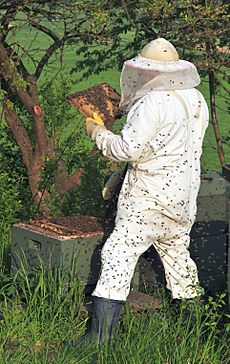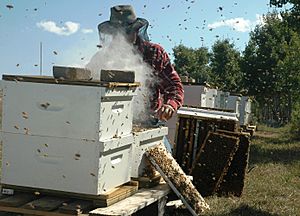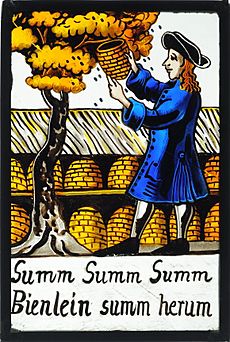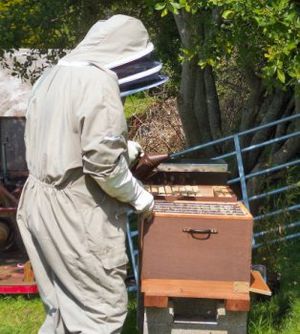Beekeeper facts for kids
A beekeeper is a person who takes care of honey bees. This practice is called beekeeping.
Honey bees make useful things like honey, beeswax, pollen, and royal jelly. Some beekeepers also raise queen bees and other bees to sell. Beekeepers also help fruit and vegetable farms by letting their bees pollinate crops. Many people keep bees as a fun hobby. Others do it to earn money, either part-time or as a full-time job. The reason someone keeps bees affects how many bee colonies they have.
Contents
What is a Beekeeper?
Beekeepers are also known as honey farmers or apiarists. The word "apiarist" comes from the Latin word "apis," meaning "bee." A beekeeper looks after honey bees in special boxes called beehives. Bees are not like pets; they are not "domesticated." Beekeepers own the hives and equipment, but the bees are free to fly around and gather food. They can even leave the hive if they want to. However, bees usually return to the beekeeper's hive because it offers a safe, clean, and dark home.
Different Kinds of Beekeepers
Most beekeepers are hobby beekeepers. These people usually have only a few hives. They are often interested in nature and how ecosystems work. Any honey they get is a bonus from their hobby. Setting up a small bee farm and working with the hives takes a lot of time and money. Because of this, hobby beekeeping usually does not make a profit, except in some places where organic honey is in high demand.
A sideline beekeeper tries to make money from bees but also has another job. Sideline beekeepers might manage up to 300 bee colonies. They can produce a lot of honey each year, which can be worth thousands of dollars.
Commercial beekeepers manage hundreds or even thousands of bee colonies. The biggest ones might have up to 50,000 colonies and produce millions of pounds of honey. One of the first big commercial beekeepers was Petro Prokopovych from Ukraine in the early 1800s. He had 6,600 colonies. Today, companies like Adee Honey Farm in the USA have 80,000 colonies. Commercial beekeepers make up only about 5% of all people with bees, but they produce about 60% of the world's honey. This type of beekeeping is growing, especially for services like pollinating crops.
What Beekeepers Produce
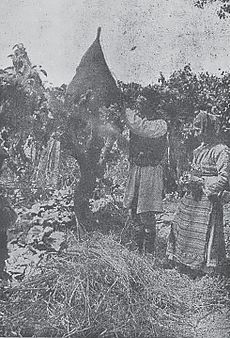
Most beekeepers produce commodities to sell. Honey is the most valuable product. Beekeepers who focus on honey try to keep their bee colonies very strong. They place hives in areas where there are many flowers for nectar. They sell liquid honey and sometimes comb honey. Beekeepers can sell their products directly to customers or through larger companies.
Other valuable products from bees include Beeswax, pollen, royal jelly, and propolis. For example, beekeepers in Taiwan export tons of royal jelly. This is a special food that queen bees eat. Most modern beekeepers do not keep bees just for beeswax. Beeswax is usually collected when honey is harvested and then sold separately.
Some beekeepers offer a pollination service to other farmers. These beekeepers might not sell any honey. They move their bee hives at night to different farms. This ensures that fruit and vegetable crops, like almonds, apples, and blueberries, have enough bees to help them grow. Farmers pay these beekeepers for keeping strong bee colonies and moving them to their fields.
Queen breeders are special beekeepers who raise queen bees for other beekeepers. They keep special bees with good qualities. They often raise their bees in places where spring starts early. These breeders also provide extra bees to other beekeepers who want to start new hives or grow their bee farms. Queen breeders use special tools like Jenter kits to produce many queen bees quickly.
Famous Beekeepers
Since Petro Prokopovych became the first major commercial beekeeper, many people have helped beekeeping grow. They have studied bee genetics, written important books, and created new tools. These beekeepers have guided the profession.
- Petro Prokopovych
- Johann Dzierzon
- L. L. Langstroth
- Anton Janša
- Peter Pavel Glavar
- Émile Warré
- Brother Adam
- Moses Quinby
- Juraj Fándly
- Gregor Mendel
- Georges de Layens
- Robert A. Holekamp
- Charles Dadant
- Amos Root
- Walter T. Kelley
- Roger Morse
- Tarlton Rayment
- Erika Thompson
- Gordon Dougan
See also
 In Spanish: Apicultor para niños
In Spanish: Apicultor para niños
Images for kids
-
Beekeeper on an old German stained glass painting. Underneath the refrain of a children's song by Hoffmann von Fallersleben
 | John T. Biggers |
 | Thomas Blackshear |
 | Mark Bradford |
 | Beverly Buchanan |


